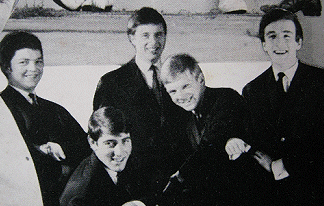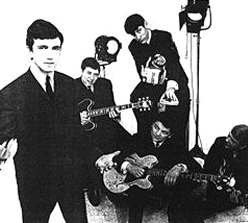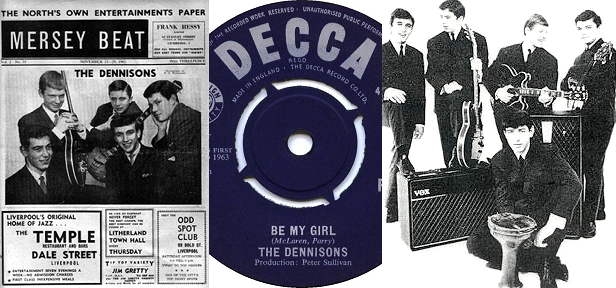Sixties
City presents
a wide-ranging series of
articles on all aspects of the Sixties, penned by the creator of the iconic
60s music paper Mersey
Beat
|
Sixties
City presents
a wide-ranging series of
articles on all aspects of the Sixties, penned by the creator of the iconic
60s music paper Mersey
Beat
|
||||||
|
 |
The Dennisons
seemed set for major stardom. When they first appeared at The Cavern, on
Tuesday 1st May 1962, lead singer Eddie Parry was only 16, but compere Bob
Wooler was to say, "They've created the biggest impression on Merseyside
since The Beatles". The group, who were named after a Liverpool street,
went on to tour with artists such as Tommy Roe and Ben E. King and King
was so impressed with the group that he penned a number specially for them,
'You Don't Know What Love Is', which became the flipside of their single
'Walkin' the Dog'. When they formed in July 1961, they comprised Eddie on vocals, Ray Scragge on rhythm guitar and vocals, Clive Hornby on drums, Steve McLaren on lead guitar/vocals and Alan Willis on bass and were initially managed by Clive's parents. Hornby, who had been working as an account clerk for six months, gave up his job to join the band. It was said that they had initially gained the inspiration to form a band after watching rehearsals with a local group called The Ravens (who later evolved into Faron's Flamingos). They'd attend the rehearsals and write down the chords of the songs. They then made their debut with a Saturday night residency at the BICC club in Melling. Clive recalls, "We were booked to do 40 Friday-night gigs at BICC and became very popular, very quickly, in Liverpool. When that happened and we were in demand to play elsewhere, we found ourselves still playing off those dates for almost nothing. We performed on the same bill as The Beatles a few times, at The Cavern and Aintree Institute, before they broke nationally. They were a big group in Liverpool and we could see what they were going to do". |
| Alan was
replaced by Terry 'Tex' Carson in December 1962 because he didn't want to
abandon his apprenticeship to turn professional. They were making such an
impression in Liverpool that Decca rushed to sign them. They also signed
a management contract with the Manchester organisation Kennedy Street Enterprises
and turned professional in 1963. The Dennisons appeared on Cavern bills
with The Beatles during 1962: on Wednesday 25th July, Saturday 13th October
and Sunday 25th November. Their 1963 Cavern appearances with The Beatles
took place on Sunday 20th January and Friday 12th March. Decca released three singles by the group. The first was 'Come On Be My Girl' which Eddie and Steve wrote backstage at The Cavern during an all night session. It was released in July 1963 on Decca F11691 and reached No.46 in the charts. Their next single, the Rufus Thomas number 'Walkin' the Dog' issued on Decca F11880 reached No.36 in the charts and was probably unlucky in the fact that the Rolling Stones had just covered the number on their latest album, issued around the same time. They appeared on 'Ready, Steady, Go!' performing the number on May 22nd 1964. When it was played on 'Juke Box Jury' one of the panellists, the gravely-voiced 'Carry On' star Sid James, noted the rasping voice of Roy and commented: "If I knew who that feller was, I'd buy him a drink". It's interesting to note that the group was offered the Lennon & McCartney number 'All My Loving', but turned it down. Their third and final single was 'Nobody Like My Babe', released in November 1964 on Decca F11990, with 'Lucy (You Sure Did It This Time)' on the flip. Although it had a commercial sound, it didn't enter the charts. By 1965 a disillusioned Parry decided to leave, the group turned semi-pro and soul singer Colin Areety joined them as they changed their style and became a soul group. However, they seemed to be going nowhere, so Clive left to join RADA and became a successful actor. |
 |
 |
The group
finally disbanded in 1967. Sadly Terry Carson died in 1991 and the group
reformed briefly for a tribute concert in his memory. The remaining three
members also reformed for an appearance on Clive Hornby's 'This Is Your
Life'. Alan Willis died in 1991, Steve contracted multiple sclerosis and
died in 1993, Eddie succumbed to a heart attack in 1995, and Ray (who was
born Raymond Arthur Scragge on 4th August 1961) died from throat cancer
on February 7th 2001. Clive remains the only surviving member. He was born in Liverpool on 20th October 1944. He says, "A lot of people thought The Dennisons would take over from The Beatles, but we just drifted into different areas and split up. I decided I wanted to be an actor and took lessons at the Crane Studios for an hour a week. The other boys in the band took the mick out of me something rotten, then I went to Liverpool Playhouse and was given a job as an assistant stage manager. A year there learning about theatre made me think I should go to drama school. I got in at LAMDA, in London, and I realised this was for me. All I wanted to do was be an actor". After leaving The Dennisons he did become an actor and appeared in a production of 'In His Own Write' at The Playhouse Theatre, Liverpool, in 1968 and in 1980 replaced Andrew Burt as Bert Sugden in the ITV soap 'Emmerdale'. He married actress Helen Weir, who portrayed Pat Sugden, in 1984, although they have since split up. Discography: 'Be My Girl' c/w. 'Little Latin Lupe Lu', issued on Decca F11691 in August 1963 and reached No.46 in the British charts. 'Walkin' The Dog' c/w 'You Don't Know What Love Is' was issued on Decca FL880 in February 1964 and reached No.36 in the charts. 'Nobody Like My Babe' c/w 'Lucy (You Sure Did It This Time)' issued on Decca F11990 in July 1964 and didn't chart. |
|
Article
|